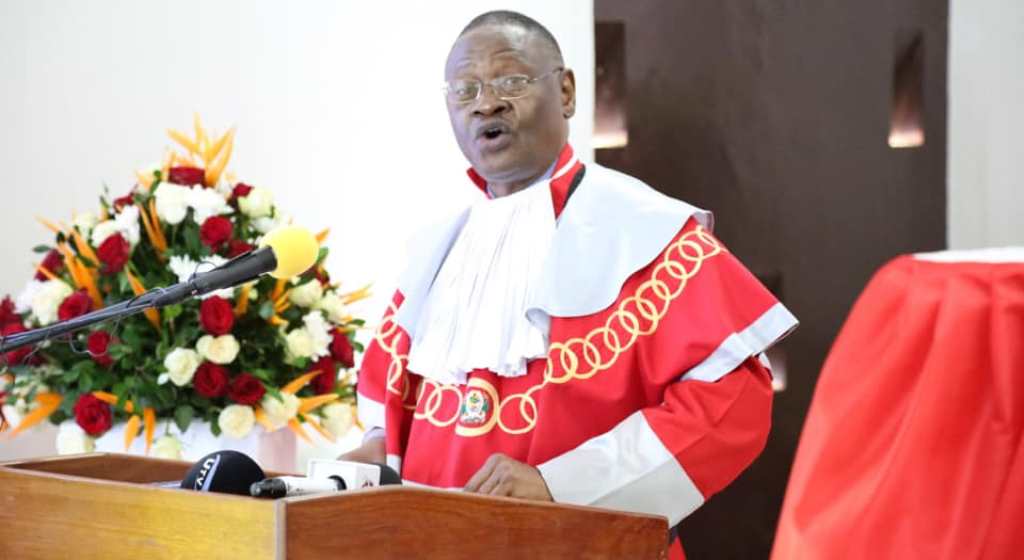AfricaPress-Tanzania: THE Chief Justice Prof Ibrahim Juma has told new magistrates to embrace ‘ Ten Commandments’, if they want to become the best and dependable in justice dispensation.
Officiating a swearing in ceremony for 71 Resident Magistrates at Karimjee Grounds in Dar es Salaam on Friday, Prof Juma challenged the magistrates to prove that they have a call to perform, and are ought to perform their duties in accordance with the law.
“Avoid corrupt practices as well as any circumstances that may lead citizens to distrust the Judiciary. Also, denounce corrupt practices to other employees because you cannot provide services in the Judiciary considered as notorious for misconduct, while you count yourself as being ethical,” he urged.
The CJ further directed the magistrates to avoid using threatening language to citizens, saying that is a sign of incompetence and often aims to intimidate the parties not to inquire or seek clarification on the decision the court has made in their case.
The Chief Justice also said that voice of the Magistrate must be heard by all citizens attending the court session, thus he or she should not whisper and deny the people around the right to know what is going on.
“Observe the court’s jurisdiction to avoid receiving and hearing cases that you have no authority. Doing so will help the parties not to waste time and costs conducting a case in a court that has no jurisdiction,” Prof Juma further said.
He pointed out that the magistrates should make sure they give decisions in time. For Primary Courts the proceedings should be completed within six months, as any case which remains undetermined within such period falls into backlog, he said.
Prof Juma, meanwhile, disclosed that there are proposed amendments of the law to allow Advocates to represent citizens in the Primary Courts.
“This is a good thing that aims to expand the scope ofaccess to justice. However, do not let Advocates cause delay
of disposal of cases and cause backlog,” he warned.
The CJ also pointed out that mediation is a constitutional requirement. He said, therefore, that Advocates should not be used to prevent the process, instead encourage the parties who have already filed their case in court to settle on those the law allows.
“Settlement has several benefits that facilitate timely access to justice… and the parties remain in good neighbourly, fraternal and non-violent friendship. It avoids costs incurred if the case is heard from the lower levels of the court to the Court of Appeal,” he said.
Prof Juma also directed the new magistrates to avoid getting into unnecessary conflicts with government officials at the Divisional, District and Regional levels, as every leader has limits to his or her legal and constitutional authority.
He said authority conflicts have no place at all because magistrates and government officials have their own areas of authority and they are all there to serve the people. He implored the judicial officers to also learn from their seniors.
The Chief Justice was, however, quick to warn them to be careful not to inherit mistakes of their predecessors. He also directed the magistrates to read and understand all the laws governing the conduct of cases at Primary Courts.
“Do enough research before writing judgment or ruling, as your decisions will help the parties to resolve their dispute completely instead of making your decisions with challenges,” the CJ said, adding, “research also helps courts, which will hear
your appeals to understand you reached the decision.”
The Chief Justice also reminded the magistrates of other ten guidelines called “Maxims for Magistrates” which the Second Chief Justice of Tanganyika (1924- 1929), Sir William Alison Russell, wrote in a book in 1928, called Handbook For Magistrates, for the use of new magistrates.
One of the guidelines requires the magistrate not to try to evade responsibility for any decision he or she makes as they are the ultimate authority on what they write in their judgments or decisions.
“Do not convict anyone, just because out there in the community he is known to be of bad character. The evidence presented before you must convince you that the accused has indeed committed the offence with which he is charged,” Prof Juma said.
He went on explaining that the magistrate should not hesitate to acquit a suspect where testimony against him or her is not sufficient to sustain the conviction even if such judicial officer thinks that the suspect has committed an offence.
The CJ further pointed out that the magistrate should not hesitate to convict a suspect whose evidence convinces that he or she has committed an offence, even if that person has high social status and dignity.
“Do not go beyond the evidence presented in court in your decisions and do not judge based on the wishes of the leaders above you or by flattering yourself to get a promotion or position or to satisfy anyone,” warned the head of judiciary.
He warned also that magistrates should not allow themselves to be drawn into a conversation about the case before them or to be in a place where other people are talking about the case he or she is hearing.
The CJ said that a wise judge is one who does not discuss his case and agrees to be part of the discussion. He further warned them not to get upset or angry while hearing a case even if the accused, witness, or other court official has offended or provoked you.
“Do not forget the fact that the magistrate is the supreme leader of the case before him and he must exercise selfcontrol
and always show that he is a leader who can control witnesses and defendants who do not behave or speak polite language,” the CJ said.
Prof Juma further cautioned the new magistrates not to be seen as a quick-witted judicial officer or anxious to speed things up even when patience deserves it.
“Conduct your cases with respect and dignity,” he implored.






